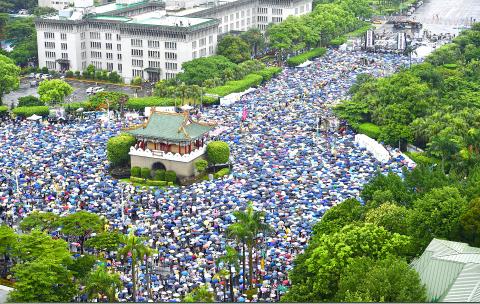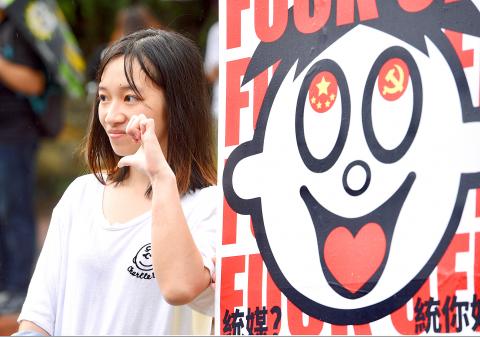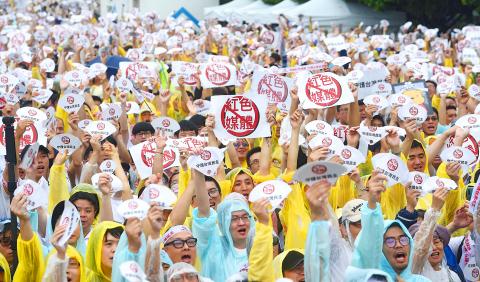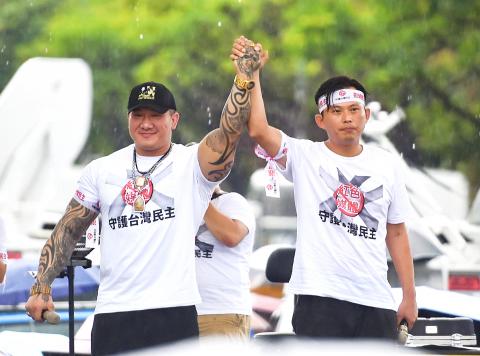Tens of thousands of people yesterday rallied in Taipei to protest against media outlets that spread fabricated news for Beijing and called for tighter regulations to counter China’s manipulation of local media.
Demonstrators started arriving on Ketagalan Boulevard in front of the Presidential Office Building as early as 7am, despite the rain, for the protest, which began at 2pm.
The purpose of the rally is to oppose Chinese authoritarianism, said Internet celebrity Holger Chen (陳之漢), who organized the protest with New Power Party (NPP) Legislator Huang Kuo-chang (黃國昌).

Photo: Peter Lo, Taipei Times
China has seriously infiltrated Taiwan’s media and businesses, with CtiTV News (中天新聞) being an obvious example, he said.
The network “reports whatever it likes and promotes [certain politicians] to a godlike status,” he said, adding that he wonders how many people have been brainwashed by its so-called news.
“We want such media outlets to go away,” he said, urging people to stand up against media manipulation and defend Taiwan regardless of their age and party affiliation.

Photo: Peter Lo, Taipei Times
Chen said that before the rally, a representative from Want Want China Times Media Group (旺旺中時集團) — which owns CtiTV and the Chinese-language China Times newspaper — approached him, asking for a chance to clarify things on his Internet show and saying they were willing to make improvements.
He told the representative that all they need to do is to report about the Tiananmen Square Massacre and human rights violations in Hong Kong, Chen said.
He was referring to reports earlier this month that the China Times gave only limited coverage to massive protests against a controversial extradition bill in Hong Kong and that it removed all content directly related to the massacre shortly after the incident’s 30th anniversary.

Photo: Liu Hsin-de, Taipei Times
Hopefully, the rally will prompt lawmakers to improve laws to counter Chinese infiltration and motivate the executive branch to crack down on media outlets that have been infiltrated, Huang said.
“It is important that we build a defense mechanism based on the idea of ‘defensive democracy’ to protect Taiwan’s democracy and the rule of law, which are under attack,” he said.
The freedoms of speech and the press should be protected, but there must be boundaries, he added.

Photo: Liu Hsin-de, Taipei Times
Huang said he had invited all major parties and presidential hopefuls to the rally, but only the Democratic Progressive Party (DPP) and the NPP sent representatives.
“China has not only infiltrated Taiwan’s media, but also its schools, communities, temples and other organizations,” DPP Secretary-General Luo Wen-jia (羅文嘉) told the crowd.
To counter Chinese infiltration, which aims to chip away at Taiwan’s democracy, the nation needs to have laws requiring companies controlled by foreign states to disclose their relationship and related activities, he said.
Taiwan does not need news media that distort the truth to promote the interests of Beijing, NPP Chairman Chiu Hsien-chih (邱顯智) said.
The NPP legislative caucus would push for the passage of laws against infiltration and other national security bills, he added.
Former Causeway Bay Books manager Lam Wing-kei (林榮基), filmmaker Kevin Lee (李惠仁) and Taipei City councilors Chiu Wei-chieh (邱威傑) and Miao Po-ya (苗博雅) also attended the rally.

CHAOS: Iranians took to the streets playing celebratory music after reports of Khamenei’s death on Saturday, while mourners also gathered in Tehran yesterday Iranian Supreme Leader Ayatollah Ali Khamenei was killed in a major attack on Iran launched by Israel and the US, throwing the future of the Islamic republic into doubt and raising the risk of regional instability. Iranian state television and the state-run IRNA news agency announced the 86-year-old’s death early yesterday. US President Donald Trump said it gave Iranians their “greatest chance” to “take back” their country. The announcements came after a joint US and Israeli aerial bombardment that targeted Iranian military and governmental sites. Trump said the “heavy and pinpoint bombing” would continue through the week or as long

TRUST: The KMT said it respected the US’ timing and considerations, and hoped it would continue to honor its commitments to helping Taiwan bolster its defenses and deterrence US President Donald Trump is delaying a multibillion-dollar arms sale to Taiwan to ensure his visit to Beijing is successful, a New York Times report said. The weapons sales package has stalled in the US Department of State, the report said, citing US officials it did not identify. The White House has told agencies not to push forward ahead of Trump’s meeting with Chinese President Xi Jinping (習近平), it said. The two last month held a phone call to discuss trade and geopolitical flashpoints ahead of the summit. Xi raised the Taiwan issue and urged the US to handle arms sales to

BIG SPENDERS: Foreign investors bought the most Taiwan equities since 2005, signaling confidence that an AI boom would continue to benefit chipmakers Taiwan Semiconductor Manufacturing Co’s (TSMC, 台積電) market capitalization swelled to US$2 trillion for the first time following a 4.25 percent rally in its American depositary receipts (ADR) overnight, putting the world’s biggest contract chipmaker sixth on the list of the world’s biggest companies by market capitalization, just behind Amazon.com Inc. The site CompaniesMarketcap.com ranked TSMC ahead of Saudi Aramco and Meta Platforms Inc. The Taiwanese company’s ADRs on Tuesday surged to US$385.75 on the New York Stock Exchange, as strong demand for artificial intelligence (AI) applications led to chip supply constraints and boost revenue growth to record-breaking levels. Each TSMC ADR represents

State-run CPC Corp, Taiwan (CPC, 台灣中油) yesterday said that it had confirmed on Saturday night with its liquefied natural gas (LNG) and crude oil suppliers that shipments are proceeding as scheduled and that domestic supplies remain unaffected. The CPC yesterday announced the gasoline and diesel prices will rise by NT$0.2 and NT$0.4 per liter, respectively, starting Monday, citing Middle East tensions and blizzards in the eastern United States. CPC also iterated it has been reducing the proportion of crude oil imports from the Middle East and diversifying its supply sources in the past few years in response to geopolitical risks, expanding